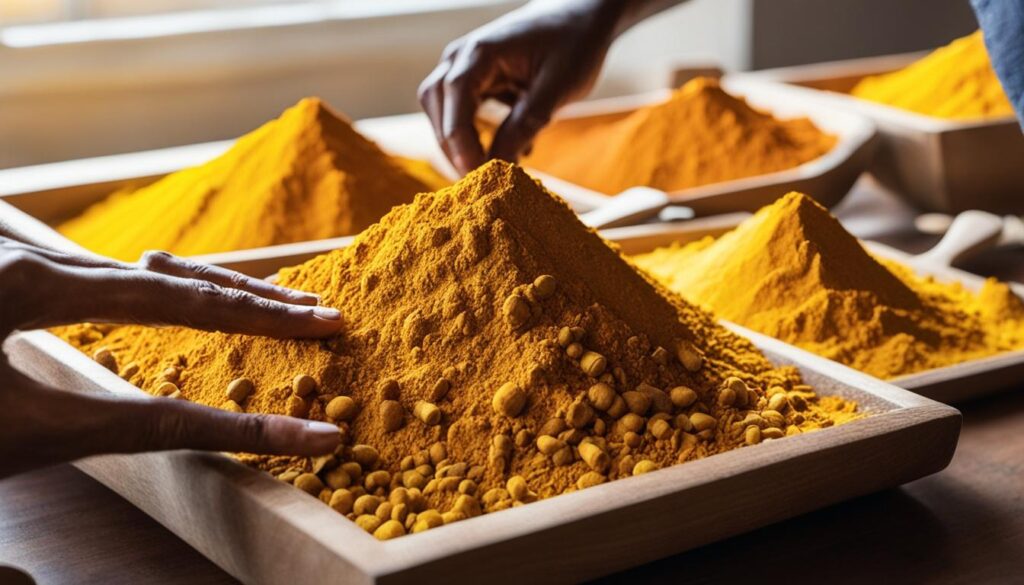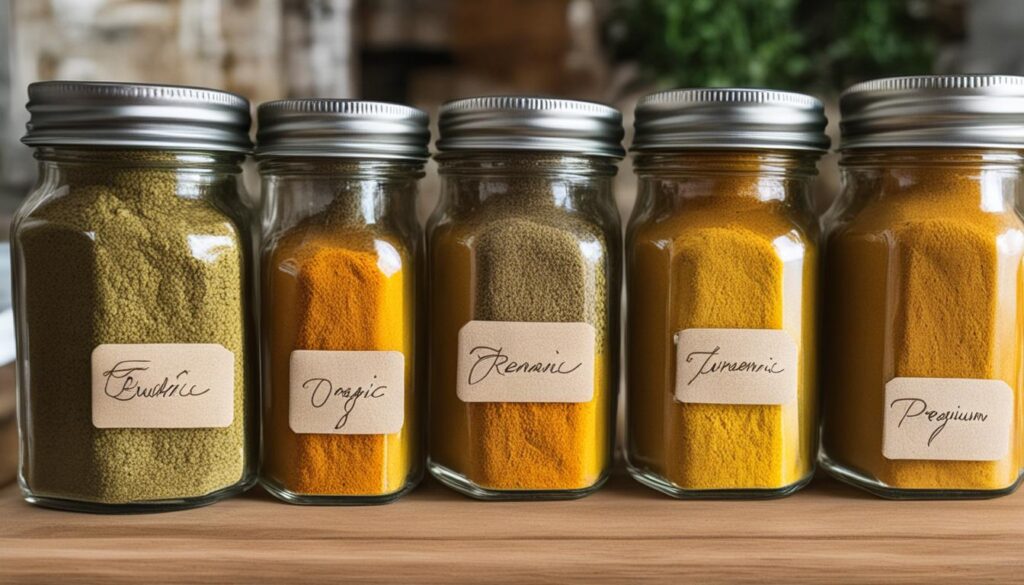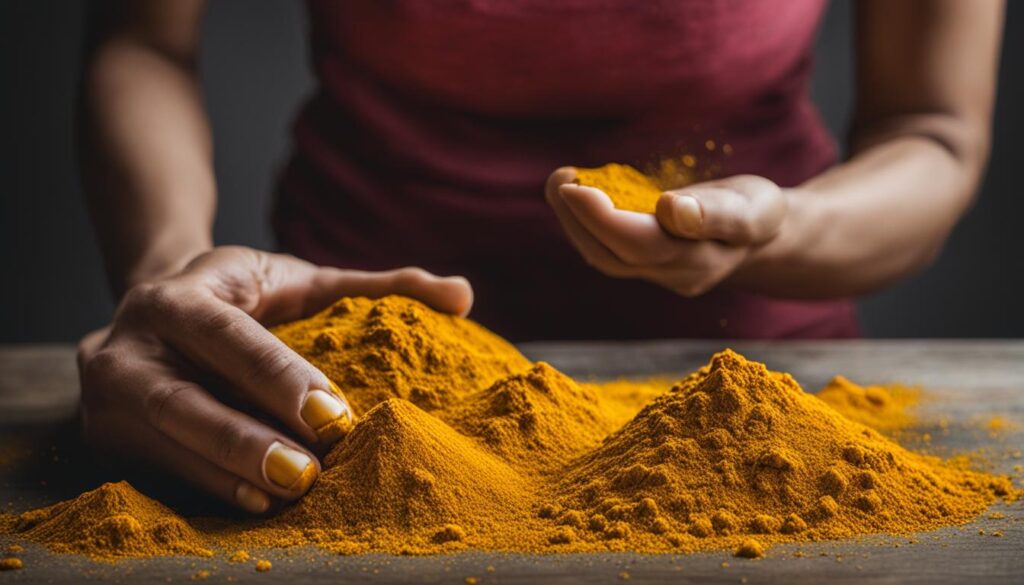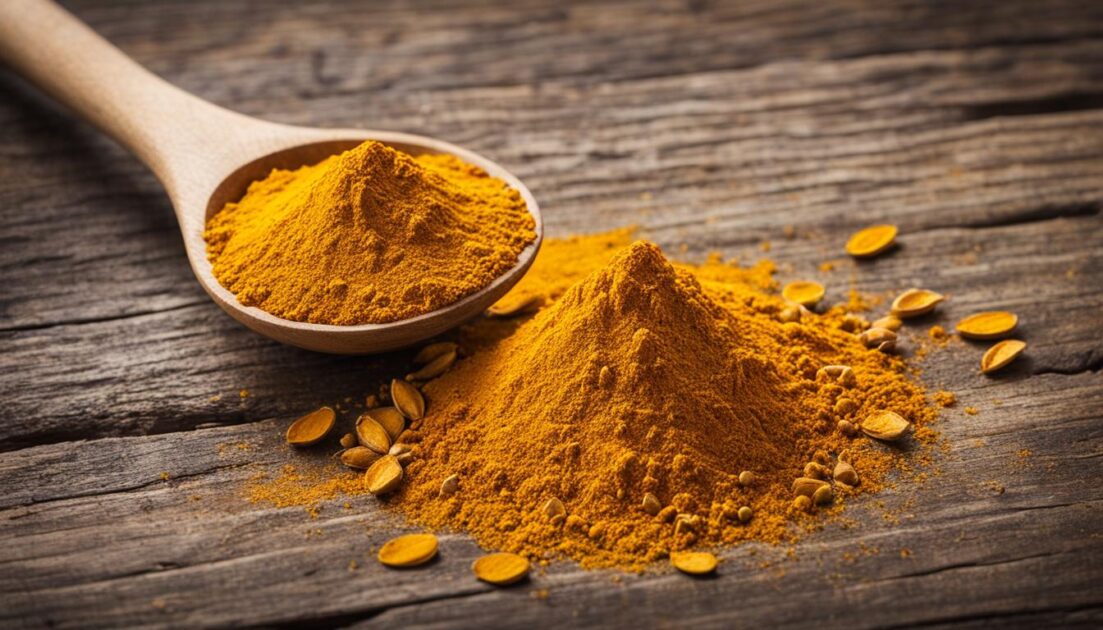Hello readers, today I want to talk to you about the incredible uses and benefits of turmeric. This deep, golden-orange spice has been used for centuries in cooking and traditional medicine. Its main active compound, curcumin, has been studied for its antioxidant and anti-inflammatory properties. Let’s explore the many ways turmeric can enhance our health and well-being.
Key Takeaways:
- Turmeric is a versatile spice with a long history of use in cooking and traditional medicine.
- Curcumin, the active compound in turmeric, has antioxidant and anti-inflammatory properties.
- Turmeric has been shown to manage inflammation, alleviate pain, improve skin clarity, and aid in weight loss.
The Science Behind Turmeric

Turmeric, also known as Curcuma longa, has been a subject of scientific research due to its potential health benefits. The active compound in turmeric, curcumin, has gained attention for its anti-inflammatory effects and its ability to manage various health conditions. Studies have shown that curcumin can be beneficial for inflammation, pain relief, and other health concerns.
One of the key benefits of turmeric is its anti-inflammatory properties. Inflammation is a natural response that helps the body heal and repair itself. However, chronic inflammation can lead to various health issues, such as arthritis and allergies. Research has shown that curcumin can help reduce inflammation by inhibiting certain inflammatory substances in the body.
Furthermore, turmeric has been studied for its potential in managing pain. Curcumin has been found to have analgesic properties, which can help relieve pain and discomfort. This makes turmeric a natural alternative for individuals looking for pain relief without relying on traditional pain medications.
“Curcumin has been found to have analgesic properties, which can help relieve pain and discomfort.”
In addition to inflammation and pain relief, turmeric has been explored for its potential benefits in mood disorders such as depression. Some studies suggest that curcumin may have antidepressant effects by modulating certain neurotransmitters and reducing oxidative stress in the brain. It has also shown promise in supporting brain health, potentially protecting against age-related cognitive decline and dementia.
Disclaimer: The statements made in this article have not been evaluated by the Food and Drug Administration. Turmeric is not intended to diagnose, treat, cure, or prevent any disease.
| Turmeric Benefits | Turmeric for Inflammation | Turmeric for Pain Relief |
|---|---|---|
| Anti-inflammatory effects | Reduces inflammation | Relieves pain |
| Potential mood disorder support | Manages arthritis | Natural alternative to pain medications |
| Brain health support | Alleviates allergy symptoms |
Turmeric as a Natural Culinary Ingredient

Turmeric is a versatile spice that is widely used in cooking, particularly in Indian cuisine. Its vibrant yellow color and distinct flavor make it a popular ingredient in various dishes. Not only does turmeric add a unique taste to your meals, but it also provides numerous health benefits.
Flavorful and Nutritious:
Turmeric is known for its warm, earthy flavor that adds depth to any dish. Whether you’re preparing a curry, stew, or soup, a sprinkle of turmeric can elevate the taste profile and create a rich and aromatic experience. Along with enhancing the flavors, turmeric also offers a range of essential nutrients. It is a good source of dietary fiber, vitamins, and minerals, including manganese, iron, and potassium.
Pairs Well with Other Ingredients:
Turmeric blends harmoniously with a variety of other ingredients, enhancing their flavors and creating a well-balanced dish. It pairs particularly well with ginger, garlic, and black pepper. The combination of these spices not only adds complexity to your recipes but also offers potential health benefits.
Potential Health Benefits:
Incorporating turmeric into your cooking can provide potential health benefits. Turmeric contains a compound called curcumin, which has anti-inflammatory and antioxidant properties. These properties may help support a healthy immune system, reduce inflammation, and protect against chronic diseases. While further research is needed, preliminary studies suggest that turmeric may have potential benefits for conditions such as arthritis, heart disease, and certain types of cancer.
Discover the culinary possibilities of turmeric by trying out different turmeric recipes. Whether you’re a seasoned chef or a beginner in the kitchen, adding turmeric to your cooking can enhance the taste, aroma, and nutritional value of your dishes.
Try These Delicious Turmeric Recipes:
- Turmeric-spiced Vegetable Curry
- Golden Turmeric Milk
- Roasted Turmeric Cauliflower
- Turmeric Chicken Skewers
Turmeric in Personal Products and Household Uses
Turmeric is not just limited to culinary uses. Its benefits extend beyond the kitchen and into personal care and household applications. The vibrant spice has been cherished in traditional medicine for its remarkable skincare properties.
When it comes to personal care, turmeric offers a range of benefits for the skin. It is known to reduce acne and its associated inflammation, resulting in clearer and healthier-looking skin. Moreover, turmeric has skin brightening properties, adding a natural radiance to your complexion.
To harness the potential of turmeric for skin health, it can be used topically in various homemade skincare products. Face masks formulated with turmeric can help rejuvenate and nourish the skin. Scrubs containing turmeric gently exfoliate, revealing a smoother and more youthful appearance. Additionally, creams enriched with turmeric contribute to maintaining well-hydrated and supple skin.
Not limited to personal care, turmeric has practical uses around the house as well. Its natural dyeing properties make it an excellent choice for coloring fabrics. You can create unique designs and patterns using turmeric to add a touch of vibrancy to your textiles.
Turmeric also serves as a cleaning agent for household surfaces. Its antimicrobial and antibacterial properties make it an effective natural alternative for disinfecting and sanitizing. From kitchen countertops to bathroom tiles, turmeric can help keep your home clean without the use of harsh chemicals.
Benefits of Turmeric in Personal Care:
- Reduces acne and inflammation
- Brightens the skin
- Rejuvenates and nourishes the skin
- Gently exfoliates
- Hydrates and maintains skin suppleness
Practical Uses of Turmeric in Household:
- Natural dye and stain for fabrics
- Natural cleaning agent for household surfaces
To learn more about the uses and benefits of turmeric, continue reading our article. The next section explores turmeric supplements and usage tips.
Turmeric Supplements and Usage Tips

While turmeric can be consumed as a spice in cooking, some people may choose to take turmeric supplements to experience its full benefits. It is important to select high-quality supplements that contain curcumin and are combined with black pepper or piperine for better absorption.
Turmeric tea is another popular way to consume turmeric. When using turmeric, it is recommended to combine it with black pepper to enhance its bioavailability. Turmeric tea can be made by steeping fresh or powdered turmeric in hot water. Adding a squeeze of lemon or a dash of honey can enhance the flavor.
Here are some usage tips for incorporating turmeric into your daily routine:
- Add a sprinkle of turmeric to your morning smoothie or yogurt for an antioxidant boost.
- Mix turmeric into salad dressings or marinades for a vibrant color and earthy flavor.
- Try using turmeric in your favorite soup or stew recipe for an added nutritional punch.
- Make a delicious golden milk latte by blending turmeric, warm milk (dairy or plant-based), honey, and a pinch of black pepper.
“Adding turmeric to your diet can provide a range of health benefits, but it’s important to be cautious with turmeric supplements, as they may interact with certain medications.”
It is always advisable to consult with a healthcare professional before starting any new supplement or making significant changes to your diet, especially if you are taking medications or have any underlying health conditions.
| Turmeric Supplement | Key Features |
|---|---|
| Brand A | Contains 95% curcumin extract |
| Brand B | Enhanced with black pepper for better absorption |
| Brand C | Organically sourced turmeric |
Selecting the Best Quality Turmeric

When it comes to purchasing turmeric, selecting a high-quality product is key to ensure you reap its maximum benefits. Here are some essential factors to consider:
- Color and Aroma: Look for turmeric that has a vibrant, deep orange color and a strong, aromatic scent. This indicates freshness and potency.
- Fresh or Powdered: Fresh turmeric root is generally preferable as it provides the most robust flavor and nutritional content. However, if you opt for powdered turmeric, ensure it is pure and free from any additives or fillers.
- Storage and Packaging: Check the packaging for airtight seals to ensure freshness. Store turmeric in a cool, dark place away from direct sunlight to preserve its quality and potency.
Here is a table summarizing the key factors to consider when selecting the best quality turmeric:
| Factors to Consider | Description |
|---|---|
| Color and Aroma | Choose turmeric with a vibrant, deep orange color and a strong, aromatic scent. |
| Fresh or Powdered | Fresh turmeric root provides the most robust flavor and nutrients, while powdered turmeric should be pure and free from additives. |
| Storage and Packaging | Look for airtight packaging and store turmeric in a cool, dark place to maintain its quality and potency. |
By considering these factors, you can ensure you are selecting the best quality turmeric for your culinary and wellness needs.
Proper Storage of Turmeric

To maintain the freshness and potency of turmeric, it is crucial to store it correctly. Whether you have whole turmeric root or ground turmeric, proper storage techniques can help preserve flavor, aroma, and nutritional value. Let’s explore the best practices for storing turmeric.
Freezing Whole Turmeric Root
If you have whole turmeric root, freezing it can be an effective way to extend its shelf life. Start by cleaning the root and removing any dirt or debris. Next, place the turmeric root in a freezer-safe bag or container, ensuring it is sealed tightly. Label the container with the date of freezing for reference. Frozen turmeric root can last for several months without losing its quality. When needed, simply grate or chop the frozen root for use in recipes.
Storing Ground Turmeric
Ground turmeric is commonly used in cooking and is prized for its vibrant color and distinct flavor. To maintain its freshness, store ground turmeric in an airtight container. Choose a container that is opaque to protect the turmeric from light. Keep the container in a cool, dark place, such as a pantry or cupboard. Avoid storing it near sources of heat or direct sunlight, as exposure to these elements can degrade its quality. By following these storage guidelines, you can ensure that your ground turmeric remains potent and flavorful.
Preventing Flavor and Nutrient Loss
Proper storage of turmeric is essential to prevent flavor and nutrient loss. Turmeric contains volatile oils and phytonutrients that can degrade over time if exposed to air, light, or excessive heat. By storing turmeric in airtight containers, away from direct sunlight and heat sources, you can minimize the loss of these valuable compounds.
“Storing turmeric in airtight containers, away from direct sunlight and heat sources, can minimize the loss of valuable compounds.”
Additionally, it is recommended to use freshly ground turmeric whenever possible. Ground turmeric tends to lose its potency over time, so grinding small amounts as needed can help maintain its robust flavor and health benefits.
By following these storage recommendations, you can ensure that your turmeric stays fresh, flavorful, and nutrient-rich, enhancing your culinary creations and promoting your well-being.
Precautions and Potential Interactions
Incorporating turmeric into your daily routine can provide many health benefits, but it is essential to be aware of potential precautions and interactions related to turmeric consumption. While turmeric is generally safe for most people, some individuals may experience side effects or interactions with certain medications.
Allergic Reactions
Some individuals may be allergic to turmeric and may experience adverse effects such as rash, hives, or abdominal pain. If you have a known allergy to turmeric or any related spices, it is best to avoid the use of turmeric in your diet or as a supplement.
Turmeric Supplements and Medication Interactions
Turmeric supplements, particularly those that contain concentrated amounts of curcumin, may interact with certain medications. It is important to consult with a healthcare professional before starting any new supplement or making significant changes to your diet, especially if you are taking any of the following medications:
- Pain relievers (such as aspirin or ibuprofen)
- Chemotherapy drugs
- Blood thinners (such as warfarin)
- Immunosuppressive drugs
These medications may interact with turmeric and its active compounds, potentially affecting their efficacy or increasing the risk of side effects. Consulting with a healthcare professional will help ensure that you can safely incorporate turmeric into your routine without any negative effects.
Consult a Healthcare Professional
If you have any underlying health conditions or are currently taking medications, it is always advisable to consult with a healthcare professional before adding turmeric to your diet or taking turmeric supplements. They will be able to provide personalized advice based on your specific situation and help you determine the appropriate dosage and usage.
Turmeric Side Effects

While turmeric is generally well-tolerated, it is important to be aware of potential side effects, particularly when consuming high doses of curcumin, especially from supplements. Some individuals may experience gastrointestinal issues, such as diarrhea, constipation, or vomiting. If any adverse effects occur, it is crucial to follow recommended dosage guidelines and consult with a healthcare professional.
It is worth noting that the majority of side effects are associated with high concentrations of curcumin found in supplements, rather than dietary turmeric. For most people, incorporating turmeric into their diet in moderation is unlikely to cause any significant side effects.
If you are considering using turmeric supplements or consuming turmeric in concentrated forms, it is advisable to consult with a healthcare professional. They can provide personalized guidance based on your specific health condition and medication regimen.
Turmeric Side Effects Summary
| Side Effects | Cause |
|---|---|
| Diarrhea | High doses of curcumin from supplements |
| Constipation | High doses of curcumin from supplements |
| Vomiting | High doses of curcumin from supplements |
It is important to exercise caution when using turmeric supplements and to ensure that they are taken according to recommended dosage guidelines. Monitoring your body’s response and seeking professional advice will help mitigate any potential side effects.
Summary and Conclusion
Turmeric is a remarkable spice with a wide range of uses and potential health benefits. Its active compound, curcumin, has been extensively researched and proven to possess anti-inflammatory, antioxidant, and other therapeutic properties. Incorporating turmeric into your daily routine can contribute to your overall well-being.
One of the primary ways to enjoy the benefits of turmeric is by using it in your cooking. By adding turmeric to your dishes, you not only enhance their flavor and appearance but also introduce potential health advantages. Turmeric has been shown to manage inflammation, alleviate pain, promote clear skin, and assist in weight loss.
While the culinary use of turmeric can be beneficial, higher doses of curcumin may require supplementation. Choosing high-quality turmeric products is crucial to ensure you receive the full benefits. Additionally, it’s important to be aware of potential interactions and precautions, especially if you are taking medications. Consulting with a healthcare professional before making any significant changes to your diet is always advisable.
In summary, turmeric is a versatile spice that offers a wealth of potential health benefits. From its anti-inflammatory properties to its antioxidant effects, turmeric has demonstrated its therapeutic value. By selecting the best quality products and considering supplementation when necessary, incorporating turmeric into your daily routine can support your overall health and well-being.
FAQ
What are the uses and benefits of turmeric?
Turmeric has a variety of uses and health benefits. It can be used as a spice in cooking to add flavor and color to dishes. Turmeric has also been shown to have anti-inflammatory and antioxidant properties, making it beneficial for managing inflammation, alleviating pain, improving skin clarity, and aiding in weight loss.
What is the science behind turmeric’s benefits?
Turmeric contains a compound called curcumin, which has been extensively studied for its therapeutic properties. Curcumin has anti-inflammatory effects and has been shown to help manage conditions such as arthritis, allergies, and infections. It has also been explored for its potential benefits in mood disorders, depression, and dementia.
How can I incorporate turmeric into my cooking?
Turmeric is commonly used as a spice in cooking, especially in Indian cuisine. It pairs well with ingredients like ginger, garlic, and black pepper. Turmeric can be used in curries, stews, soups, and other dishes to enhance flavor and provide potential health benefits.
Can turmeric be used in personal care products and household cleaning?
Yes, turmeric can be used in personal care products and household cleaning. It has been used in traditional medicine for its skincare benefits, including reducing acne and improving skin health. Turmeric can also be used as a natural dye or stain for fabrics and as a cleaning agent for household surfaces.
Are there turmeric supplements available?
Yes, turmeric supplements are available and can be taken to experience the full benefits of turmeric. It is important to select high-quality supplements that contain curcumin and are combined with black pepper or piperine for better absorption. Turmeric tea is another popular way to consume turmeric.
How do I select the best quality turmeric?
When purchasing turmeric, look for vibrant color and a strong aroma. Fresh turmeric root is preferable, but if using powdered turmeric, ensure it is pure and free from additives. Store turmeric in an airtight container in a cool, dark place to preserve its quality and potency.
How should turmeric be stored?
Whole turmeric root can be stored in the freezer to extend its shelf life, while ground turmeric should be stored in an airtight container in a cool, dark place away from direct sunlight. Proper storage helps prevent the loss of flavor and nutritional value.
Are there any precautions or potential interactions with turmeric?
Some individuals may be allergic to turmeric and may experience side effects such as rash, hives, or abdominal pain. Turmeric supplements may interact with certain medications, including pain relievers, chemotherapy drugs, blood thinners, and immunosuppressive drugs. It is advisable to consult with a healthcare professional before starting any new supplement or making significant changes to your diet.
What are the side effects of turmeric?
While turmeric is generally well-tolerated, high doses of curcumin, especially from supplements, may cause side effects such as diarrhea, constipation, or vomiting. It is important to follow recommended dosage guidelines and consult with a healthcare professional if adverse effects occur. Dietary turmeric typically has fewer side effects compared to high concentrations of curcumin found in supplements.
What is a summary of the uses and precautions of turmeric?
Turmeric is a versatile spice with various uses and potential health benefits. It can be used in cooking to enhance flavor and provide potential health benefits. Turmeric supplements are available for those seeking higher doses of curcumin. It is essential to choose high-quality turmeric products, be aware of potential interactions and precautions, and consult with a healthcare professional if needed.






